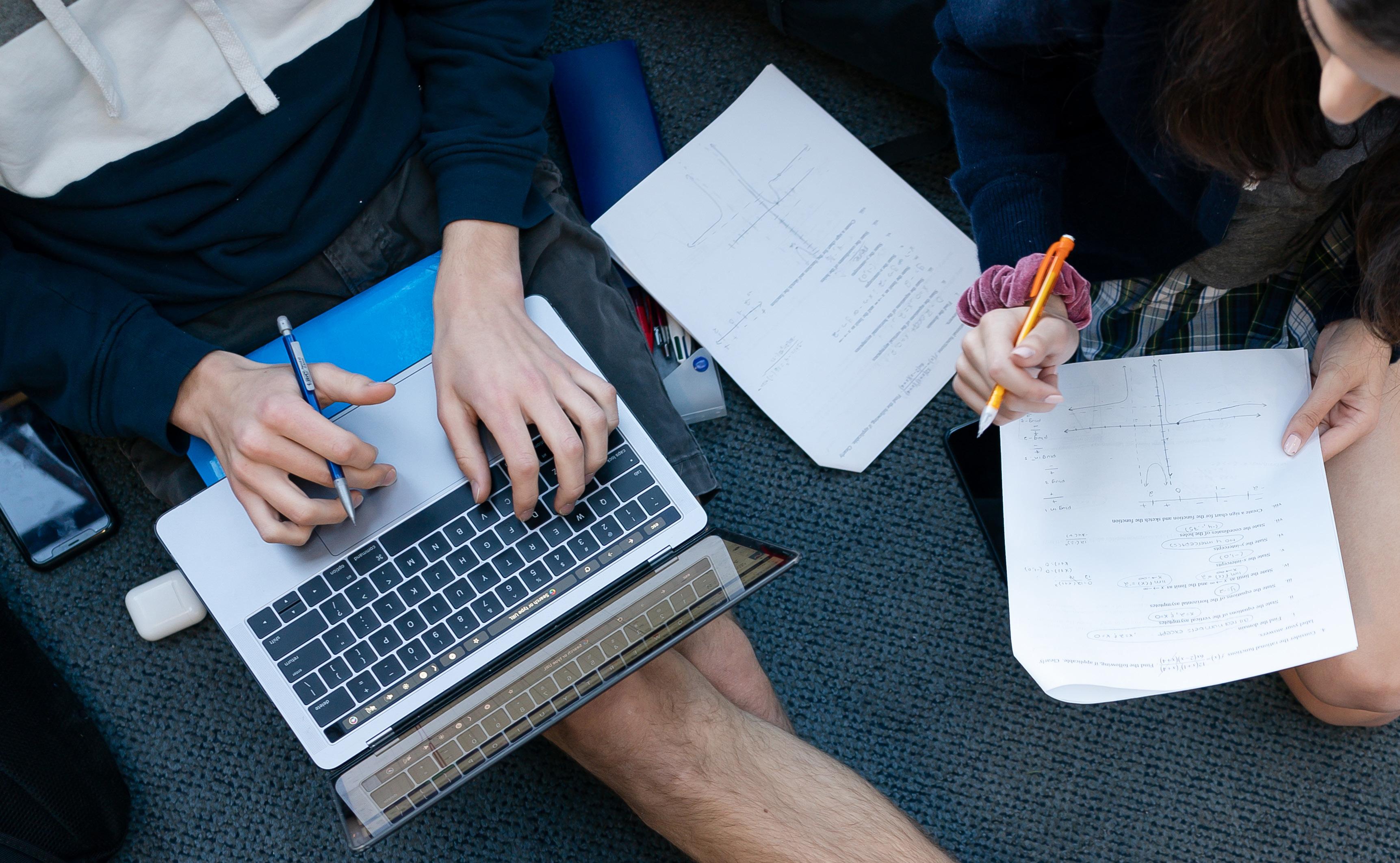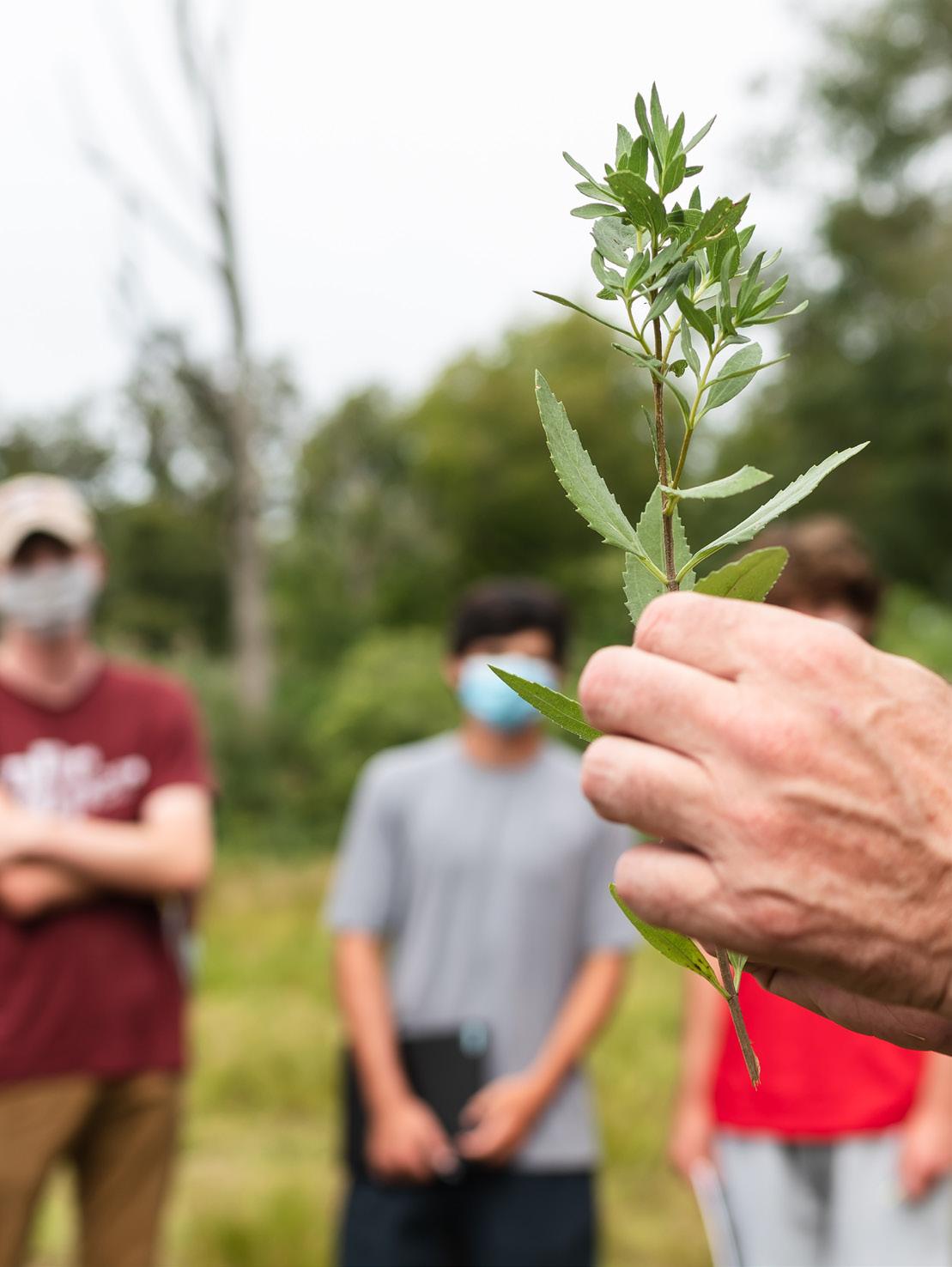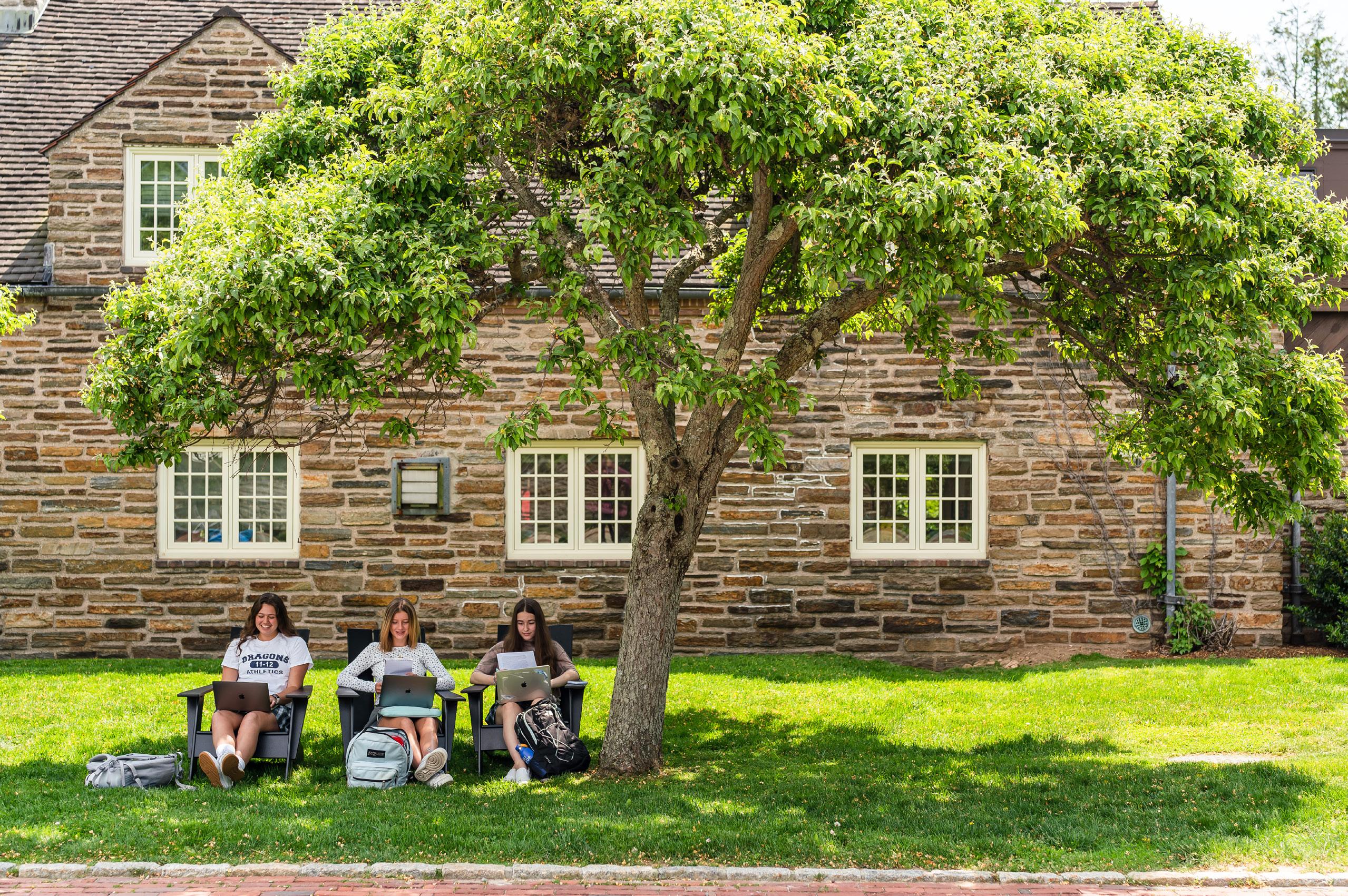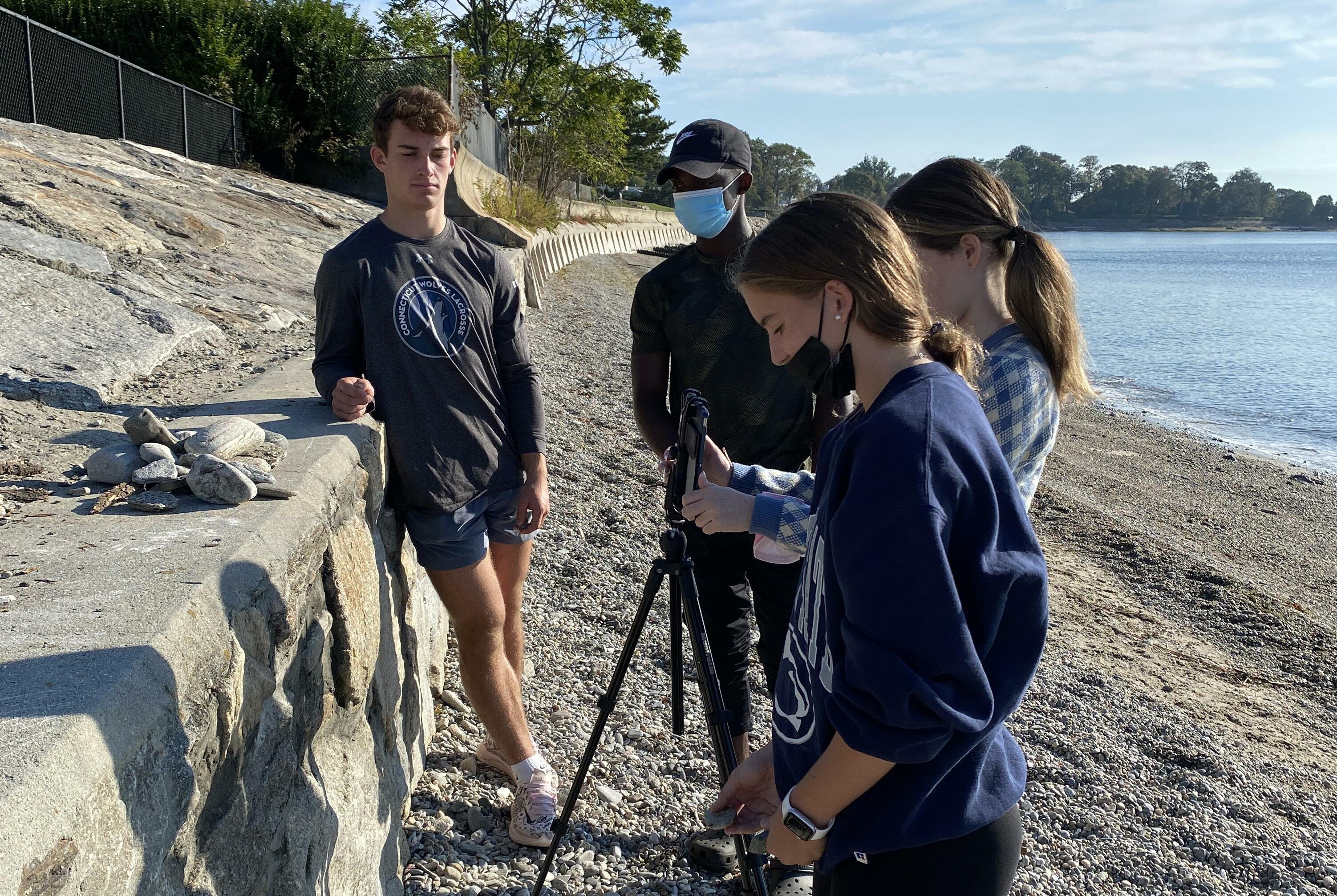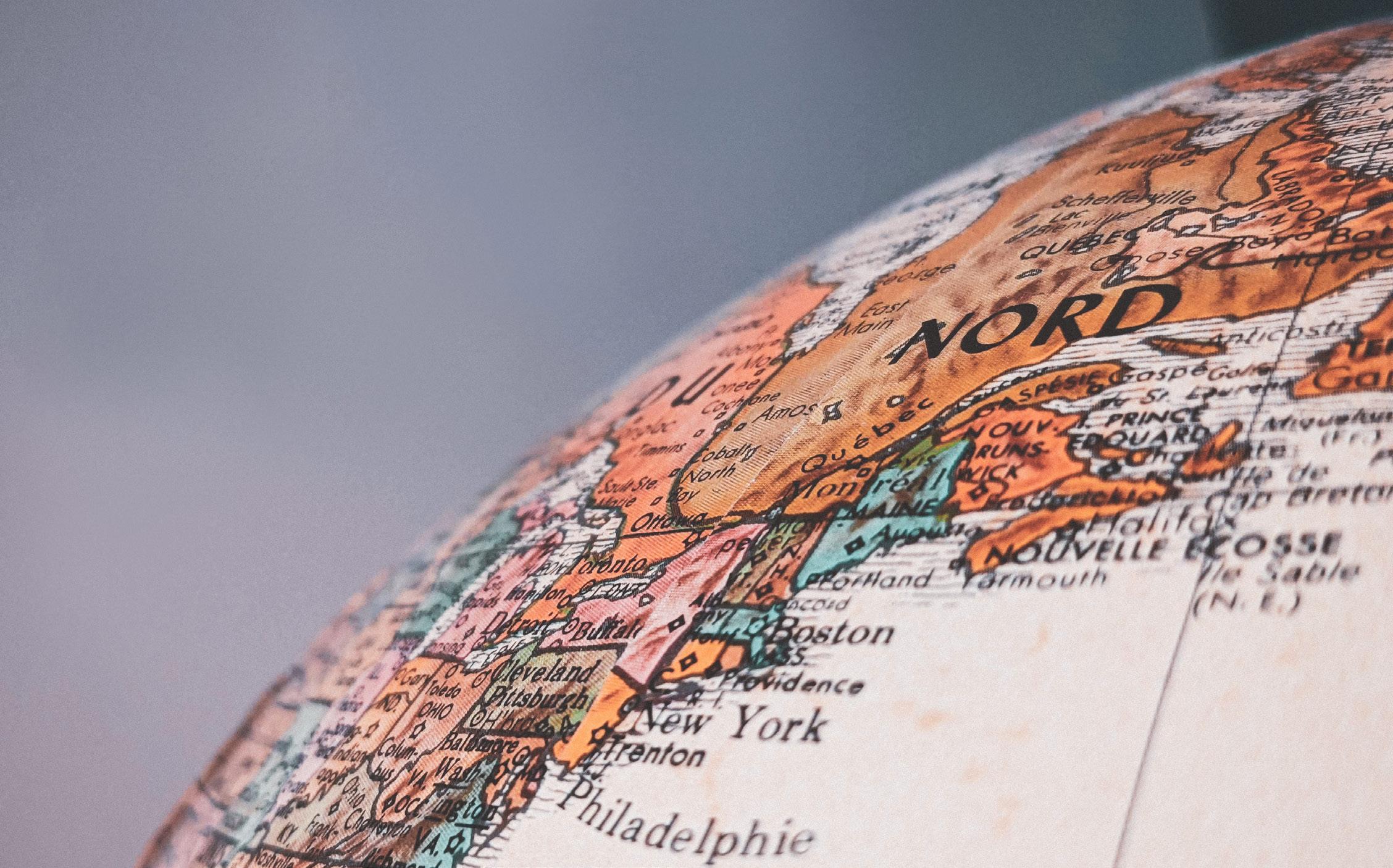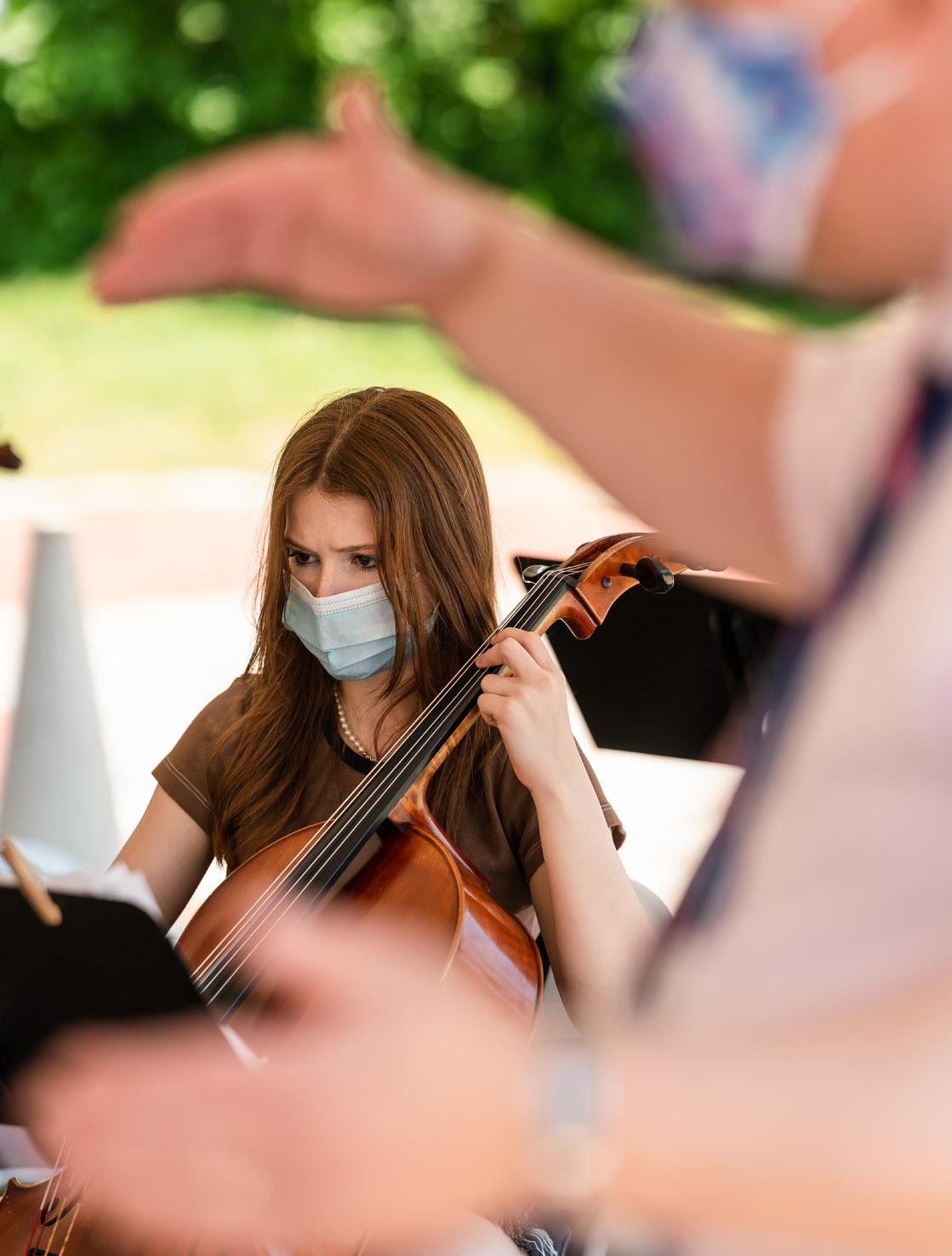
17 minute read
English
English CSED750 puzzlES, logIC, anD SImplE ComputErS
In this course, students will explore the theory of computer science by studying three related topics. Students will learn an algorithmic approach to problem-solving by studying puzzles. Students will discover the meaning behind computer programs and circuitry by learning about formal logic. Lastly, students will study the simplest computers ever designed—computers made up of paper, a pencil, and your mind. Prerequisites: Advanced Computer Science or departmental permission. Not offered in 2022-2023. (.5 credit)
CSED850 aDvanCED InquIry: ComputEr SCIEnCE, EngInEErIng, anD DESIgn
This course is the culminating experience in the Computer Science, Engineering, and Design Program. Students in this course will meet as a group to share literature and discuss experiments and projects. Some students will propose, design, and iterate on an independent project that demonstrates an understanding of interdisciplinary learning. Other students will work with the instructor to find a complex, challenging computer science problem that current college students are working on, and work to solve the problem over the course of the semester. Students in this course are expected to identify a problem or question, design and execute a meaningful project, and report on their process to the GFA community. Open to 12th-graders; prerequisites: one credit of courses in Computer Science, Engineering, and Design or departmental permission. (1 credit; full year)
ENGLISH
Our mission in the Upper School English department is to invite students to understand the disciplines of reading, writing, and thinking as indispensable gifts, ones that can help us to create lives that are really alive, to identify and meet our most essential individual and collective needs, and to undertake the conversations with ourselves and with others that is intellectual life at its best. To that end, our curriculum is designed as a sequence of experiences in which ours students will learn:
• to slow down — to pay attention — to wonder • to savor complexity • to perceive and delight in beauty • to explore and integrate the intellectual, aesthetic, emotional, and moral aspects of their own lives and identities • to express themselves truthfully, passionately, precisely,
and in voices that are their own • to listen closely — curiously, empathetically — to voices not their own, and to ponder and respond to what they hear • to discover the questions, problems, and topics that interest them, and to chart paths of inquiry into those interests — to ask questions they care about, to seek answers for those questions, and to find even more beautiful questions • to try on the identities of writer, reader, and thinker in multiple ways and in different modes • to embrace revision both as an effective process of craft and as an ethics — to think and think again, to draft, and revise, and revise again • to read widely and deeply, sometimes at the suggestion of their teachers, sometimes under their own steam • to appreciate how our lives inform our reading and writing and how our reading and writing inform our lives • to grow in freedom, wisdom, imagination, humility, courage, autonomy, and self-reliance
Eng250 EnglISh 9
Focusing on great literature in a variety of genres — including classic and contemporary fiction, creative nonfiction, poetry, and drama — students will learn to listen more carefully, empathetically, and insightfully to the voices of others and to develop their own powerful and inimitable voices. In partnership with the teacher, they will create a learning community that supports a diversity of thought, perspective, experience, and background; that recognizes such diversity as a source of strength; and that honors different voices and identities. In class, they will develop the habits of passionate and precise reading, discussing, and writing, with a special emphasis on the twin arts of close reading and Harkness discussion. Guided by the understanding that (as Saul Bellow noted) “a writer is a reader moved to emulation,” students will write creative pieces inspired by the literature they read; in their critical writing, they will often seek to understand, explain, and celebrate a text that they love. There will be opportunities for them to read and write about what matters most to them. Throughout, the course will focus on the process of reading and writing, and the primary mode of assessment — a portfolio of work chosen and curated by the student — will value not only the quality of the work but also the art of revision and the habit of self-reflection. (1 credit; full year)
Eng450 EnglISh 10
Inspired by Ralph Waldo Emerson’s call for young Americans to develop intellectual self-reliance, English 10 invites
students to grow as readers, writers, and thinkers by charting their own paths of inquiry through the artworks we read, both around the Harkness table and in their written work. Texts may include novels, short stories, essays, and poetry from the 19th century to the present. As we read, we will ask ourselves how these works grapple with their moral, psychological, religious, and political preoccupations, and we will pay special attention to the forms of expression writers use to craft meaning. Students will practice writing in genres they have learned before as well as ones that might be new to them, each time learning the shape and moves of the genre by reading exemplary pieces in the form and then writing pieces of their own inspired and informed by these exemplars. Each semester, students will submit a portfolio of critical, reflective, and creative writing as their culminating assessment. (1 credit; full year)
Eng650 EnglISh 11
In English 11, students will continue to practice the fundamental genres of literary expression to which they’ve been introduced already and learn some new ones, all with a view to figuring out which forms of reading and writing best suit their emerging talents, interests, and inquiries. In partnership with their teachers, students will create a body of original work: this work may be one of expressive literary art, or of interpretive literary scholarship, or some inventive hybrid of the two. Students in this course may elect to sit for the AP Language and Composition exam in the spring. (1 credit; full year) SEMESTER ELECTIVES Twelfth-graders will elect two semester-long courses or one year-long Advanced Inquiry. Draft course offerings are below. Below are the courses offered in 2022-23; offerings for 2022–23 may include different courses and will be shared in the spring prior to sign-up.
Eng750 thE “I” IS thE EyE — an IntroDuCtIon to DoCumEntary StuDIES
Drawing from research-based films, non-fiction narratives, and radio programs, this course will examine the modes we use to document and reveal the world around us. We will examine portrayals of real people, events, and situations — not just as real and authentic chronicles but also as creative statements of artistry and personal vision. In the spirit of the following David Foster Wallace quote, we will examine how documentaries “serve as models and guides for how large or complex sets of facts can be sifted, culled, and arranged in meaningful ways — ways that yield and illuminate truth instead of just adding more noise to the overall roar.” In addition to the compelling stories themselves, we will explore what Joan Didion called “the implacable ‘I,’ ” — the artist’s lens through which we see these narratives unfold and how this lens impacts the audience. To prepare for a culminating creative project, we will examine, analyze and discuss many great models. Texts may include Truman Capote’s In Cold Blood, James Agee’s Let Us Now Praise Famous Men, Tom Wolfe’s The Right Stuff, Serial Produc-
english
tion’s Serial and S-Town, Elizabeth Chai Vasarhelyi’s and Jimmy Chin’s Free Solo, Charles Ferguson’s Inside Job, and Steve James’s Hoop Dreams. (.5 credit; 1st semester)
Eng750 CrEatIvE WrItIng WorkShop: Short Story Craft
Creativity happens as a result of study and practice. By reading well, writing daily, and paying attention, we tap into our creative selves. In this writing workshop, we nurture creativity while we study the form of the short story and practice the craft of writing stories of our own, all in the context of a supportive, creative community. Where does the inspiration come from? It comes from the stories we read and from the lives we live, and so we need to pay close attention to both. Authors we study could include but will not be limited to: Lydia Davis, Gina Berriault, Grace Paley, Nafissa Thompson-Spires, Stuart Dybek, Lorrie Moore, Jamaica Kincaid, Margaret Atwood, TC Boyle, Joyce Carol Oates, James Baldwin, and Ernest Hemingway. (.5 credit; 1st Semester)
Eng750 naturE WrItIng anD EnvIronmEntal lItEraturE
Informed and inspired by great nature writing, students will get outdoors, pay attention to the local landscape, write and revise pieces about the natural world, and discuss and investigate sustainability issues. One set of texts will be poems, stories, and essays by writers like Basho, Thoreau, Leopold, Dillard, and Oliver; the other will be the salt marsh, the Audubon woodland, and Long Island Sound. Our main goal will be to experience, describe, understand, and care for this place — to cultivate the affection (to use Wendell Berry’s formulation) that constitutes “such love for a place and its life that [one wants] to preserve it and remain in it.” Students will read and write critically, but their primary output will be creative: poems, stories, personal essays, and photographs. They’ll also keep a journal, establish a regular sit-spot outdoors, and produce a final portfolio that showcases their best writing, revising, and reflecting. Students should expect to be outside in all weather. (.5 credit; 1st Semester)

Eng750 polItICS, proSE anD poEtry
This course focuses on texts that illustrate the vitality of the human spirit amidst societal, social, and political obstacles. Works studied will shed light on individuals and groups whose voices have been excluded from traditional literary canons and political spaces. Students will respond to the texts in informal journal writing as well as analytical essays and other assessments. All of the works emphasize the importance of learning from history in order to write new stories, whether in the United States or beyond. Readings for the class may include Rankine’s Citizen, Shakespeare’s Othello, Gay’s Bad Feminist, Coates’s Between the World and Me, Baldwin’s The Fire Next Time, Wright’s 12 Million Black Voices, and Beyoncé’s Lemonade. (.5 credit; 1st Semester)
Eng750 Can tv bE art? thE CaSE of hbo’S The Wire
By the time the final season of The Wire was released in 2008, it was widely hailed as one of the best television shows ever made, and it somehow has become only more timely and relevant in the meantime. In this course, we will enjoy and analyze this ambitious and finely crafted show. We will regularly pair our viewing of the show with readings that will help us better understand what The Wire achieved, both in terms of content and of form. Some questions we will ask are: how does the show use the medium, genres, and grammar of television to explore questions of race, power, money, work, policing, education, gender, sexuality, and other essential problems of 21st century American society? To what extent is the medium of television particularly suited for this exploration? What does it mean to experience a television show as a work of art? What might it mean to read a television show as closely as we would a novel or
poem? And what might this show reveal to us about the kind of society that we, as 21st century Americans, have inherited? We will also read the show as a speculative history of the recent past. What might it teach us about how the recent history of America is shaping our present and our possible futures? (.5 credit; 1st Semester)
Eng750 thE fEmalE pErSuaSIon
This course will focus on relationships between female characters in a variety of texts in order to analyze how these relationships can inform our cultural moment. Students will discuss what messages certain texts are perpetuating, complicating, and dismissing with regard to definitions of womanhood, female friendships, and female relationships in general. Additionally, we will study the critical response to the featured texts in order to better inform our contextual understanding. Students will respond to the texts in informal journal writing as well as analytical essays and other assessments. The class culminates in a creative project that will be largely informed by class discussions and themes within the texts. Possible texts: Roxane Gay, Bad Feminist; Anne Tyler, Vinegar Girl; William Shakespeare, The Taming of the Shrew; Marilynne Robinson, Housekeeping: A Novel; excerpts from Jane the Virgin (The CW); Insecure (HBO); The Bachelor (ABC). (.5 credit; 2nd Semester)
Eng750 blaCk amErICan voICES
This course will study an array of African American literary voices and texts from a variety of genres — poetry and song lyrics, prose fiction and essays, drama and film — and work to understand and appreciate these works in their social and historical contexts. The first half of the semester will focus on writers from the late 19th and 20th centuries, including W.E.B. DuBois, Langston Hughes, Claude McKay, Richard Wright, Margaret Walker, James Baldwin, Ralph Ellison, Alice Walker, and Lorraine Hansberry. The second half of the semester will focus on 21st-century voices, and how they are both in dialogue with their literary predecessors and opening new conversations about the past, present, and future. Topics we will encounter in these texts include individual identity, self-expression, and fulfillment; cultural, family, and community identity; historical contexts and pressures; constructions of race and gender; and social justice. Class time will be spent in student-centered, small and large group discussion with an emphasis on close reading and interpretive analysis. Students will also respond to the texts in informal journal writing, analytical essays, and creative and personal reflection pieces. (.5 credit; 2nd Semester)
Eng750 thE goat: tolStoy’S AnnA KAreninA
As Michael Jordan is to basketball and Bob Dylan is to rock and roll, so is Leo Tolstoy to the art form we call the novel: reading him feels like seeing a master bring the thing he is doing to its fullest and most perfect expression. In this course we will devote ourselves to enjoying, discussing, thinking about and writing about Tolstoy’s Anna Karenina, a novel of such scope, sociological perceptiveness, psychological acuity, and philosophical power that reading it feels like you are getting close to human life itself. In exploring the novel’s big picture and its details we will immerse ourselves in Tolstoy’s mind and world. We may come out of the experience wiser, more attuned, more intellectually and spiritually nourished, a little more alive, than we went in. (.5 credit; 2nd Semester)
Eng750 SatIrE, ComEDy, anD SoCIal ChangE
In this course we’ll test Nabokov’s notion that laughter is the best pesticide and explore the questions “What makes something funny?” and “How can humor be used to make change?” The OED describes a satire as a “work of art which uses humour, irony, exaggeration, or ridicule to expose and criticize prevailing immorality or foolishness, esp. as a form of social or political commentary.” We’ll read and discuss models of the form — including works by Aristophanes, Swift, Defoe, and Wilde — but we’ll concentrate on contemporary examples, some literary (George Saunders, Nana Kwame Adjei-Brenyah) and some otherwise (The Daily Show with Trevor Noah, Jordan Peele’s Get Out, South Park). To help us create our own satiric publications, we’ll study the “Shouts and Murmurs” section of the New Yorker, The Onion, and Reductress, the “first and only satirical women’s magazine.” We’ll learn by doing, and our writing will be creative — i.e., after learning from the professionals, we’ll write satires of our own about the ridiculous, foolish, and unjust things in our school and society. (.5 credit; 2nd Semester)
Eng750 kazuo IShIguro: butlErS, botS, anD boarDIng SChoolS
Why is Kazuo Ishiguro, winner of the 2017 Nobel Prize in Literature, one of the most celebrated contemporary novelists? What distinguishes Ishiguro as a storyteller? Who and what have influenced Ishiguro, and whom and what have Ishiguro influenced? To what extent do Ishiguro’s first-person narrators speak to the questions of our contemporary lives? How does Ishiguro exploit the archetypes and tropes of romantic, comic, and dystopian fiction? In what ways do Ishiguiro’s novels lend them-
english
selves to adaptation, and in what ways do they resist adaptation? Can we profitably read Ishiguro’s work in conversation with critical theory and literature from other disciplines? In this course, we explore three of Ishiguro’s most celebrated works, The Remains of the Day, Never Let Me Go, and Klara and the Sun. We also consider film adaptations of Ishiguro’s novels, a handful of Ishiguro’s short stories, Ishiguro’s Nobel lecture, and some of Ishiguro’s song lyrics. To develop our appreciation of Ishiguro’s concerns and craft, and to develop a better understanding of our own concerns and craft, we write in a variety of modes and for a variety of audiences, adjusting our purposes and rhetorical approaches accordingly. (.5 credit; Second Semester)
Eng750 InquIry: lItErary StuDIES or CrEatIvE WrItIng
This class allows students to propose and develop courses of study in collaboration with a faculty mentor. Students will identify an area of study or genre of writing and then, with the guidance of the faculty mentor, frame a sustained investigation or project. The inquiry will include directed reading, regular discussion, and a substantial writing component. Students may propose topics for study by approaching a faculty mentor and writing and submitting a course of study proposal. Open to 10th-12th graders(.5 credit; full year)
Eng850 aDvanCED InquIry: lItErary StuDIES
Students will identify an area of study that they want to pursue — be that a particular author, time period, cultural moment or movement, genre, or style — and then engage in a research and writing process of roughly four stages. They will (1) craft an inquiry by reading extensively in their chosen primary text field and doing original thinking and close readings in writing; (2) explore a relevant field of scholarly secondary sources to develop and put that original thinking in conversation with the field; (3) craft a more elaborated scholarly essay in conversation with these sources; (4) share their research and insights with a real audience in some relevant venue. Students will announce interest in the spring of their 11th-grade year and will craft, in conversation with their advisors, a reading list of primary texts for the summer after 11th grade. Students may work on a long-form research-analysis paper; a series of shorter, research-analysis papers; and/or a research-analysis portfolio. Students can expect to read extensively about their chosen field and then to meet with their teacher to discuss how to best apply their knowledge. The final products will be due in the spring of their senior year, and may take one of several forms. Students may showcase their research at an event modeled after the World Perspectives Symposium; they may present their research to the GFA English Department in the manner of a research symposium or defense; they may transform their scholarly research piece(s) into another written genre, such as a literary essay or retrospective review like those that appear in the New Yorker or the New York Review of Books, and either submit it for publication or share it with the GFA community in some way; or they may meet with other GFA English classes to apply and share their knowledge. Successful candidates for admission will have demonstrated curiosity and passion for the discipline, proficiency in written argument and in analytical interpretation based in close reading. Once enrolled, students will be required to do substantial reading of primary texts during the summer between 11th and 12th grades. Open to 12th-graders. (1 credit; full year)
Eng850 aDvanCED InquIry: CrEatIvE WrItIng
Charting their own creative journeys, students in this advanced, yearlong workshop will build on the writing skills and strategies they have learned, read widely and deeply in their chosen genre, produce a substantial body of original work, publish it in a fitting format, and present to a real audience. Individually, students will craft their collections of stories, poems, or essays, or their novel or novella. Collectively, they’ll constitute a tight-knit writing community, a workshop devoted to the giving and receiving of useful feedback. The class will include group readings on craft and process, and students will undertake a significant individual reading project, apprenticing themselves to a master of the genre. They’ll be expected to share drafts and reflections regularly, to give and get feedback constantly, and to revise fearlessly. Their final project will include, in addition to their creative work, a critical piece about the work of the writer they have studied, an introduction to the work of a peer, and a reflection on their own development as a writer. Students will then create a physical book with a fitting title and design to showcase their work; they will also read selections to an audience. Successful candidates for admission will have demonstrated interest, independence, and proficiency in the necessary skills. The Advanced Inquiry is for the student who, conversant with the basics, is ready to pursue ambitious and original creative work. Once enrolled, students will be expected to do required summer reading in the genre. Open to 12th-graders. (1 credit; full year)

